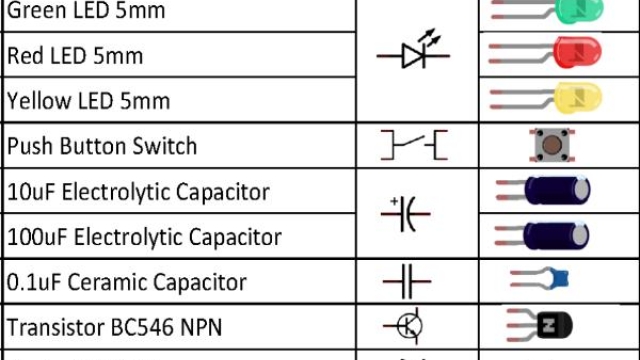
Unraveling the Wonders of Electronic Components

Welcome to the fascinating world of electronic components, where the building blocks of modern technology come together to power our everyday lives. From the intricate circuits powering our smartphones to the complex systems running our vehicles, electronic components play a crucial role in shaping the way we interact with the world around us. These tiny yet powerful devices form the backbone of the gadgets and machines that have become essential in our fast-paced digital age.
Whether you’re a tech enthusiast curious about how your devices work or a student delving into the realm of electronics, understanding the role of electronic components is key to unlocking the secrets of innovation. Through exploring the functions of resistors, capacitors, transistors, and more, we unveil the inner workings of electronic devices and unravel the mysteries behind their capabilities. Join us on this enlightening journey as we dive deep into the wonders of electronic components and discover the magic that powers our modern world.
Types of Electronic Components
One of the fundamental electronic components is the resistor, which resists the flow of electric current. Resistors come in various values to regulate the amount of current in a circuit. Another essential component is the capacitor, which stores and releases electrical energy. Capacitors are utilized in filtering, timing, and coupling applications.
Inductors are another crucial type of electronic component that stores energy in a magnetic field when current passes through them. They are commonly used in circuits that require energy storage or filtering. Transistors are semiconductor devices that amplify or switch electronic signals. They play a significant role in modern electronic devices, serving as building blocks for various applications.
Integrated circuits (ICs) are miniature electronic circuits that contain multiple components, such as transistors, resistors, and capacitors, on a single semiconductor chip. ICs have revolutionized the electronics industry by enabling compact and complex electronic systems. Diodes are semiconductor devices that allow current to flow in one direction only. They are essential for rectifying AC currents into DC currents in power supplies and for signal modulation in communication systems.
Functionality of Electronic Components
Electronic components play a crucial role in powering various devices, from smartphones to computers. These components are designed to perform specific functions within an electronic circuit, contributing to the overall functionality of the device.
Resistors are one of the fundamental electronic components that regulate the flow of electrical current in a circuit. By resisting the flow of electricity, resistors help control voltage levels and protect other components from damage due to excessive current.
Capacitors store and release electrical energy, serving as temporary energy storage devices in electronic systems. With their ability to store charge, capacitors help stabilize voltage levels and filter out unwanted signals or noise in a circuit, ensuring smooth and reliable operation.
Importance of Electronic Components
Electronic components are the building blocks of modern technology, powering everything from smartphones to spacecraft. Without these essential parts, the devices we rely on every day would not be able to function. The role of electronic components in shaping our world cannot be understated.
IGBT Module
From resistors to transistors, each electronic component serves a specific purpose in the intricate network of circuits that make up electronic devices. These components work together harmoniously to transmit, control, and amplify electrical signals, allowing for the seamless operation of electronic systems. Without them, the complexity and efficiency of modern technology would be unattainable.
The constant innovation and miniaturization of electronic components have led to the development of increasingly advanced and powerful devices. As technology continues to progress, the importance of electronic components in enabling this evolution cannot be overlooked. Their role in shaping the future of technology is paramount.



